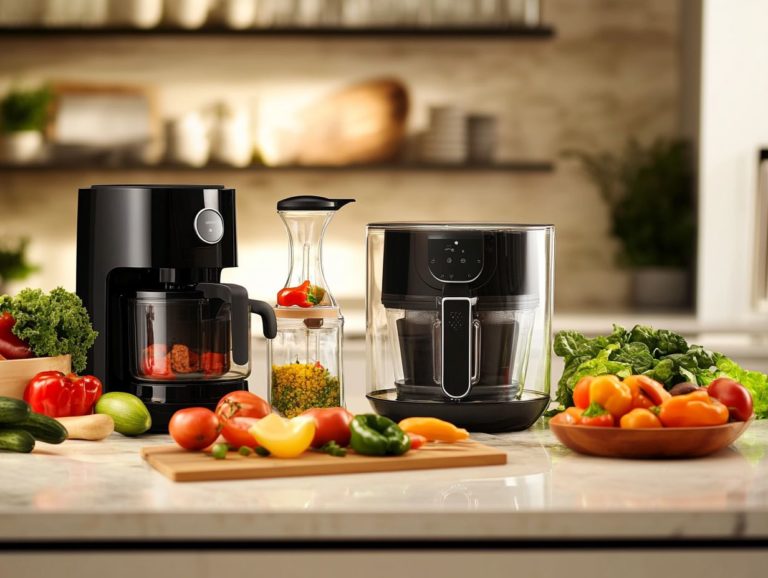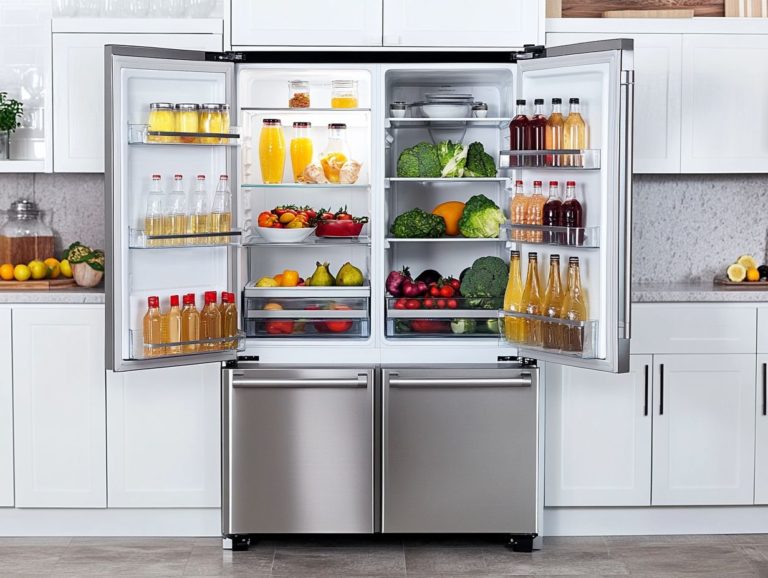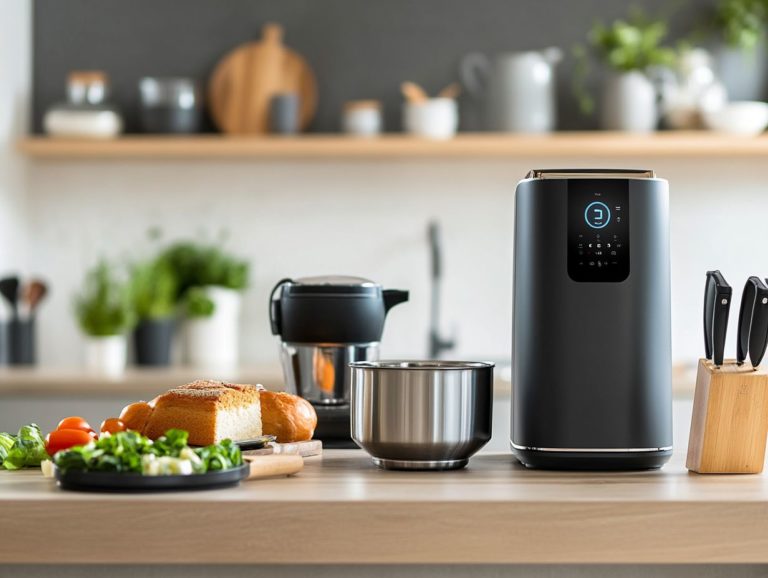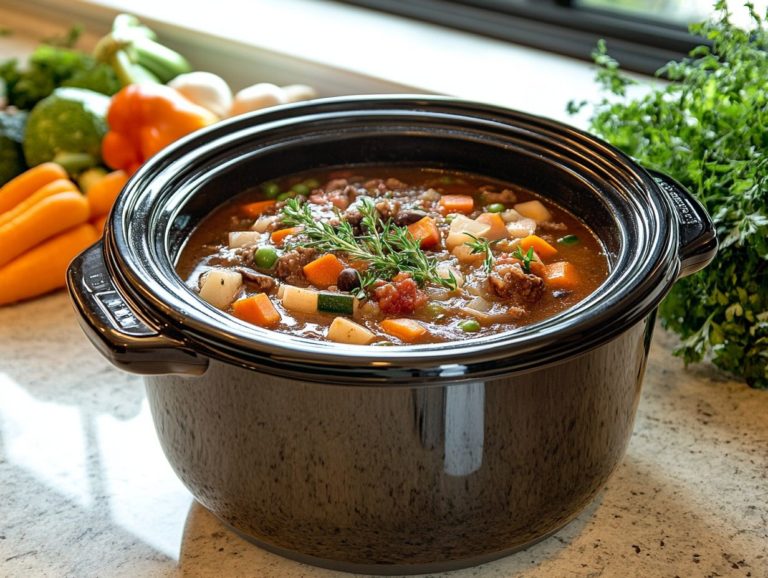5 Energy-Saving Tips for Your Kitchen Appliances
In today’s world, energy conservation is crucial. Your kitchen plays a key role in managing energy use!
Make small changes today and watch your energy bills drop! Here are five practical tips to help you choose and use kitchen appliances efficiently.
It also delves into the energy demands of common kitchen devices and highlights the benefits of adopting energy-saving practices. These changes can have a profound impact on both your finances and the planet.
Explore how simple shifts can lead to a more sustainable kitchen experience!
Contents
- Key Takeaways:
- 1. Choose Energy-Efficient Appliances
- 2. Use Your Appliances Efficiently
- 3. Keep Your Appliances Clean and Well-Maintained
- 4. Make Use of Natural Light
- 5. Unplug Unused Appliances
- Why Is It Important to Save Energy in the Kitchen?
- How Much Energy Do Kitchen Appliances Consume?
- Frequently Asked Questions
- What are some energy-saving tips for my kitchen appliances?
- Why should I care about energy-saving tips for my kitchen appliances?
- How can I make my refrigerator more energy-efficient?
- What can I do to save energy when using my dishwasher?
- Are there any energy-saving tips for my oven and stovetop?
- What are some other energy-saving tips for my kitchen?
Key Takeaways:
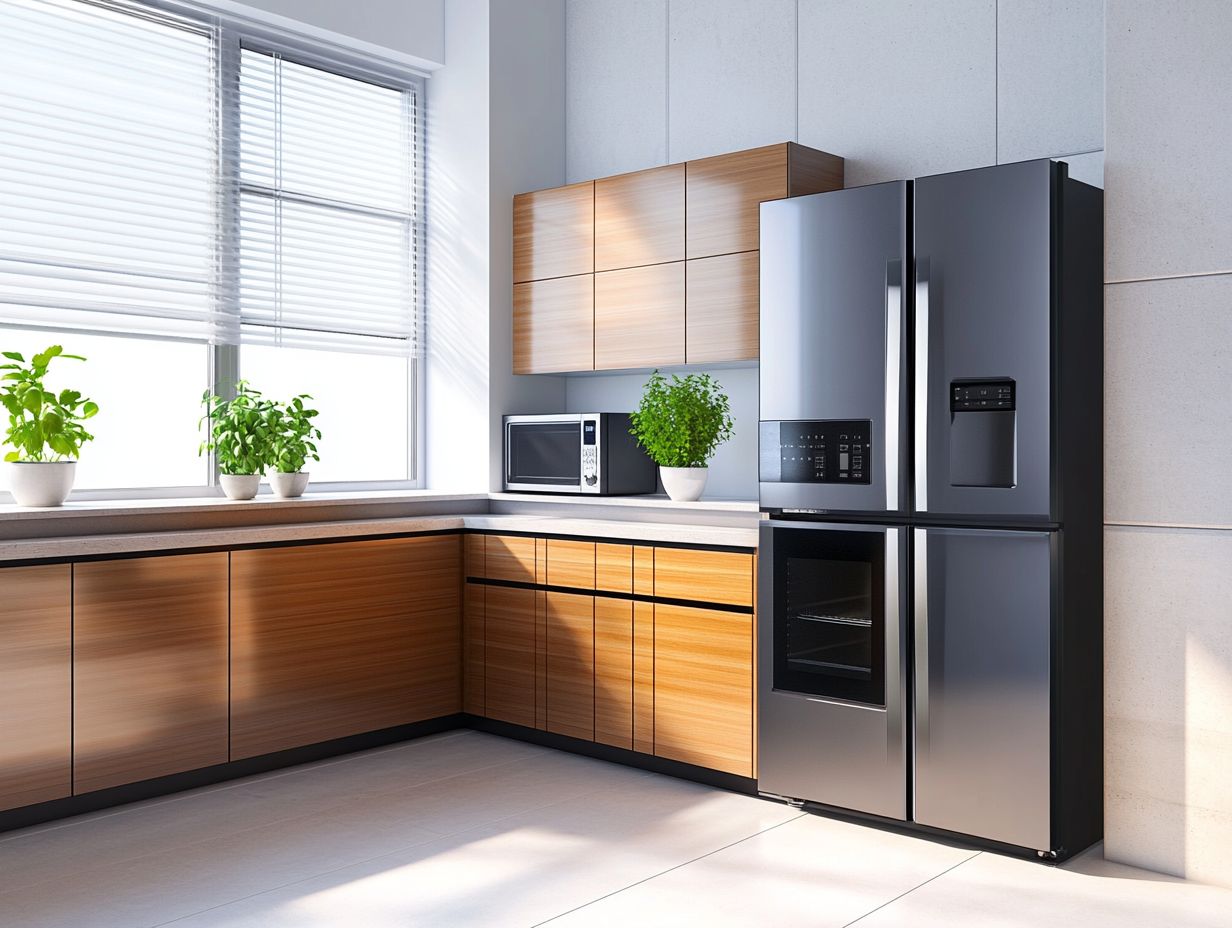
- Choose energy-efficient appliances when shopping for kitchen equipment to reduce energy consumption and save on utility bills.
- Use appliances efficiently by following manufacturer’s instructions and avoiding unnecessary use.
- Regularly clean and maintain appliances to ensure optimal energy efficiency and extend their lifespan.
1. Choose Energy-Efficient Appliances
Choosing energy-efficient appliances is a crucial step in minimizing energy use in your kitchen. These devices meet Energy Star standards and significantly reduce your energy costs while contributing to a more sustainable environment.
By selecting refrigerators, dishwashers, washing machines, and ovens with higher energy ratings, you can enjoy substantial savings on your utility bills. Plus, these models use less electricity and water, resulting in a lower environmental impact.
The Energy Star certification guarantees that these appliances meet stringent efficiency guidelines, giving you peace of mind as you make choices that are good for the planet.
You can also save more by using LED and compact fluorescent bulbs, which consume significantly less energy than traditional incandescent lights. This creates a well-rounded strategy for energy conservation in your home.
2. Use Your Appliances Efficiently
Maximizing the efficiency of your appliances is essential for reducing energy costs and enhancing your kitchen’s overall energy-saving potential.
To achieve this, load your dishwashers and washing machines to full capacity. This not only ensures you get the most out of each wash cycle but also minimizes resource usage.
When using your oven, preheat only when necessary and take advantage of residual heat to lower your energy demand.
Embrace air drying methods for both dishes and laundry as effective alternatives to traditional drying processes, allowing you to cut down on energy consumption without sacrificing cleanliness or convenience.
3. Keep Your Appliances Clean and Well-Maintained
Regular maintenance and cleaning of your appliances are essential for ensuring they operate at peak efficiency. This can significantly lower energy consumption and reduce your energy costs.
By prioritizing key tasks—cleaning refrigerator coils, dishwasher filters, and washing machine drums—you can greatly enhance the performance of your appliances.
Over time, dust and debris accumulate, hindering functionality and forcing your machines to work harder, leading to increased energy use.
A refrigerator with dirty coils expends more energy to keep your food cool, while a washing machine clogged with lint struggles with water drainage and cleaning performance.
If you neglect these straightforward maintenance tasks, you might face higher energy bills, affecting your household budget and contributing to unnecessary resource waste.
Start applying these tips now to create a more efficient kitchen!
4. Make Use of Natural Light
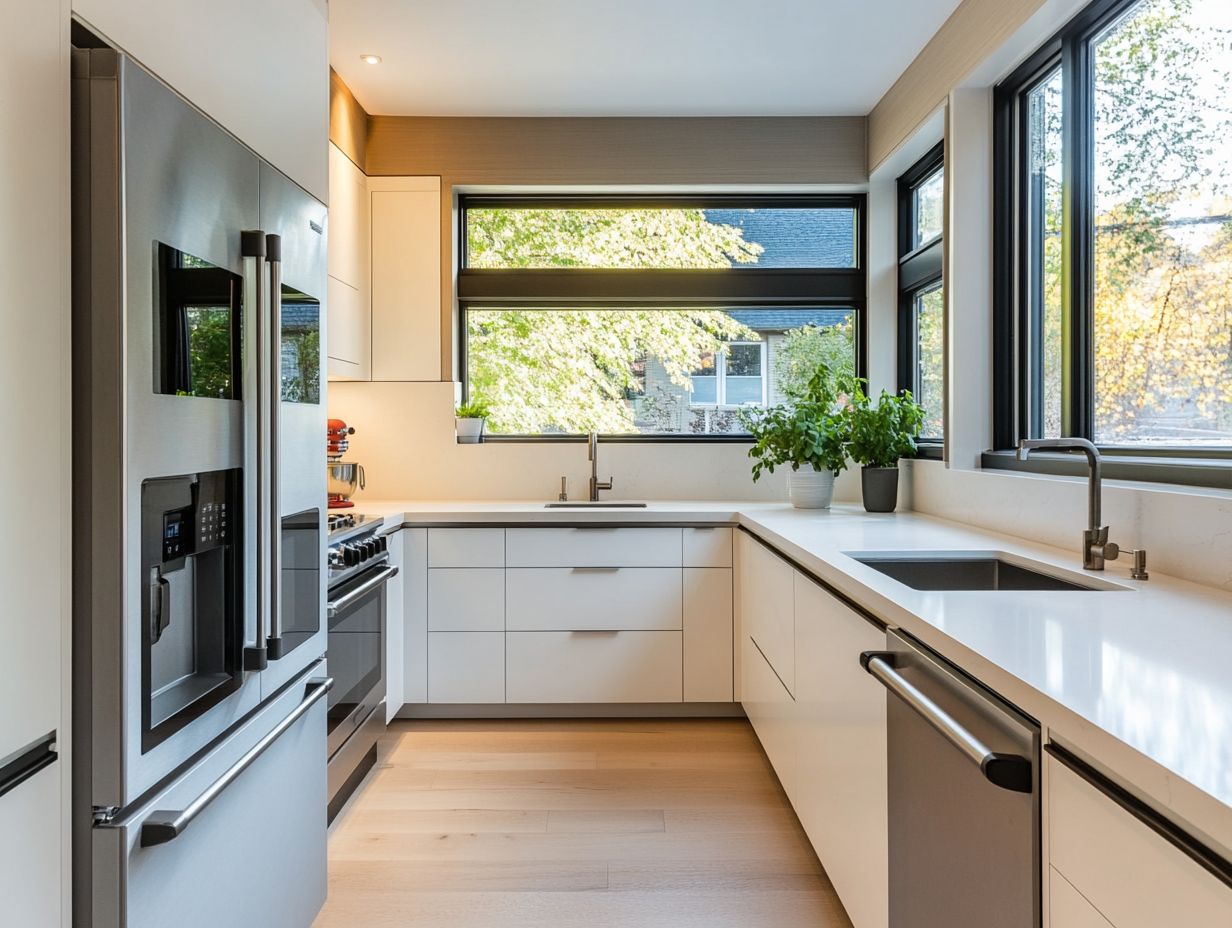
Utilizing natural light in your kitchen not only elevates the ambiance but also significantly diminishes your reliance on artificial lighting, leading to lower energy costs and a more eco-friendly environment.
By thoughtfully incorporating elements like skylights and expertly positioning mirrors to reflect light, you can craft a bright, inviting space that feels expansive. This arrangement lets sunlight fill the space all day, reducing the need for electric bulbs and transforming your kitchen into a more pleasurable place to cook and gather.
When you pair this with energy-efficient lighting options, such as LED bulbs, you can further minimize overall energy consumption, striking a perfect balance between a well-lit area and energy savings.
The end result is a harmonious fusion of aesthetics and functionality that supports sustainable living.
5. Unplug Unused Appliances
Unplugging unused appliances is a simple yet powerful way for you to combat energy wasted by appliances that are plugged in but not in use, which can quietly inflate your energy bills without providing any real benefit.
Of course, manually disconnecting each device isn’t always practical, especially in a bustling kitchen filled with an array of gadgets. This is where smart power strips come in, offering a savvy solution to the common challenge of standby power loss.
These innovative devices can be programmed to cut power to appliances when they’re not in use, effectively reducing energy waste. By connecting multiple appliances to a single smart strip, you can effortlessly manage your kitchen’s energy consumption, sidestepping unnecessary costs while enjoying the convenience and functionality that modern cooking demands.
Take charge of your energy use today!
Why Is It Important to Save Energy in the Kitchen?
Saving energy in your kitchen is essential, not just for trimming down household energy costs but also for lessening the environmental impact tied to excessive energy use. It’s truly a win-win for both your wallet and the planet.
By incorporating energy-efficient appliances and adopting thoughtful cooking practices, you can significantly lower your monthly utility bills while playing a part in reducing greenhouse gas emissions. This effort contributes to a healthier environment; after all, using less energy means relying less on fossil fuels, which are significant culprits in climate change.
Many energy-efficient solutions offer incentives or rebates that enhance your financial savings. Ultimately, focusing on energy savings not only cuts expenses but also paves the way for a sustainable future for generations yet to come.
How Much Energy Do Kitchen Appliances Consume?
Kitchen appliances play a crucial role in your household’s energy consumption, often representing a significant chunk of your energy costs due to their operational demands. In fact, studies indicate that these appliances can account for up to 30% of your total energy usage at home.
Think about it: refrigerators typically consume between 400-800 kWh annually, while dishwashers usually go through around 300-500 kWh. By transitioning to energy-efficient appliances, you can achieve a remarkable reduction in these figures.
For example, choosing an ENERGY STAR-certified appliance can save you an impressive 10-50% more energy compared to standard models. This not only translates to lower utility bills but also helps shrink your carbon footprint—truly a win-win situation.
Start implementing these tips today and watch your energy bills drop!
What Are the Most Energy-Intensive Kitchen Appliances?
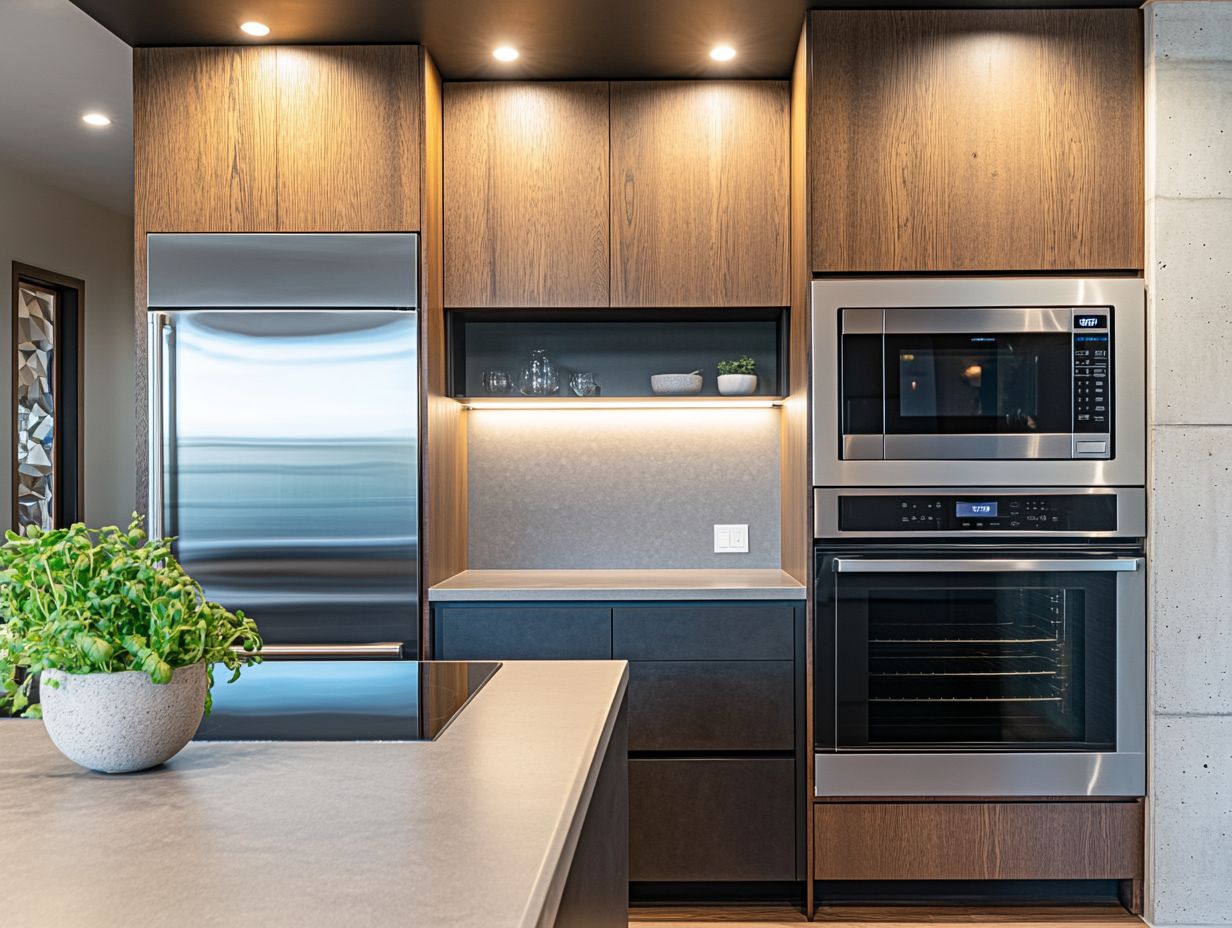
Certain kitchen appliances can be real energy hogs. They consume a surprising amount of energy relative to their usefulness. This not only affects your energy bills but also negatively impacts the environment.
Take a look at your refrigerator, dishwasher, and dryer. Together, they account for a hefty chunk of your household’s energy usage. For example, your refrigerator runs non-stop, often using more energy than all your other kitchen appliances combined.
And while dishwashers may save you precious time, if you’re not using them efficiently, they can drain both energy and water. Clothes dryers demand a significant amount of energy to operate, making them top contenders for soaring energy bills.
Exciting energy-efficient models are now available, featuring cutting-edge technology designed to minimize consumption without compromising performance. Act now to save money and protect the planet!
What Are Some Other Ways to Save Energy in the Kitchen?
Beyond simply selecting energy-efficient appliances, there are numerous strategies at your fingertips to save energy in the kitchen. These strategies will ultimately enhance both efficiency and sustainability.
One particularly effective approach is to explore alternative cooking methods. Consider using a convection oven, which circulates hot air for quicker and more even cooking, or an air fryer, which delivers crispy results with significantly less oil for healthier meals.
You might also want to implement a smart thermostat to optimize heating and cooling in your cooking areas. This ensures a comfortable environment without unnecessary energy waste.
Adopting simple yet effective practices can make a substantial difference, such as:
- Covering pots while cooking to retain heat,
- Utilizing residual heat from burners,
- Preparing meals in batches.
These strategies can collectively reduce your energy consumption during food preparation. Not only do they contribute to lower utility bills, but they also foster a more eco-friendly kitchen experience.
How Can Energy-Saving Habits in the Kitchen Benefit the Environment?
Adopting energy-saving habits in your kitchen not only slashes your energy costs but also plays a pivotal role in promoting environmental sustainability.
Every small change you make—from selecting energy-efficient appliances to refining your cooking methods—contributes to reducing your carbon footprint. These choices can significantly lessen the impact of traditional energy consumption on the environment.
As more households like yours embrace these practices, the collective effect can lead to remarkable reductions in greenhouse gas emissions. This paves the way for a brighter, more sustainable future.
Energy-efficient options not only consume less power but also lessen reliance on fossil fuels. This encourages the adoption of cleaner energy sources and nurtures a healthier ecosystem for generations to come.
What Are the Cost Savings of Using Energy-Efficient Appliances?
Transitioning to energy-efficient appliances can lead to substantial cost savings. These devices are expertly designed to minimize energy consumption while delivering optimal performance in your kitchen.
For example, when you choose an energy-efficient refrigerator, you could cut electricity usage by up to 50% compared to older models. This could translate to around $200 in savings each year.
Similarly, if you decide to replace a traditional dishwasher with a model that meets energy-saving standards, you’ll find it uses approximately 3.5 gallons of water per load, in contrast to the 6 gallons used by older versions. This switch not only results in savings on your water bill but also on your energy expenses.
Over a span of five years, these seemingly small adjustments can add up to thousands in savings. This makes your transition not just an eco-friendly choice, but also a wise financial decision.
Frequently Asked Questions
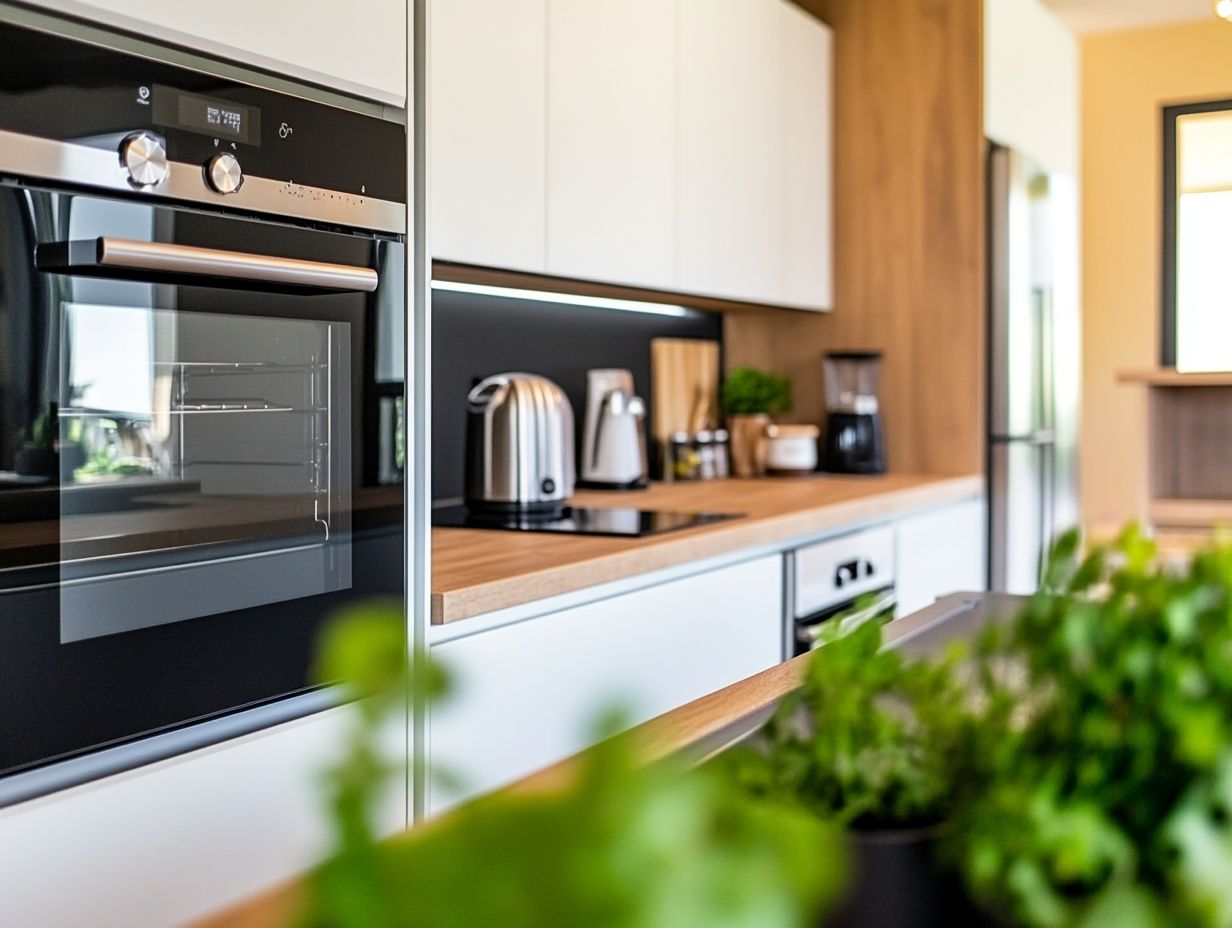
What are some energy-saving tips for my kitchen appliances?
There are several simple steps you can take to save energy and reduce your kitchen appliances’ impact on the environment.
Why should I care about energy-saving tips for my kitchen appliances?
Saving energy in your kitchen helps you lower your utility bills. It also reduces your household’s carbon footprint.
How can I make my refrigerator more energy-efficient?
Set your refrigerator’s temperature between 35-38 degrees Fahrenheit. A well-stocked fridge maintains cold temperatures better.
What can I do to save energy when using my dishwasher?
Instead of using the heat-dry setting, air dry your dishes to save energy. Always run full loads and scrape off excess food to cut down on pre-rinsing.
Are there any energy-saving tips for my oven and stovetop?
Cook multiple dishes at once to save energy in your oven. Avoid opening the door frequently while cooking.
For your stovetop, use the right burner size for your pot. Covering pots can also speed up cooking time, saving energy.
What are some other energy-saving tips for my kitchen?
Use a microwave or toaster oven for small meals; they save energy. Unplug small appliances when not in use and consider buying energy-efficient models for new purchases.

